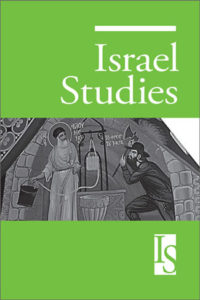World Jewish Congress – “We disappeared.” The story Of Jewish Refugees From The Middle East And North Africa
The stories of the people who witnessed the end of Jewish life in their countries of origin, from Iraq to Libya, and were forced to start from scratch: the Jewish refugees from the Middle East and North Africa. Jewish presence in Arab countries long predates Islam and the Arab conquest of the Middle East and goes back to Biblical times. According to official statistics, over 850,000 Jews were forced to leave their homes in Arab countries between 1948 and the early 1970s. Today, there are fewer than 7,000 Jews left.
Watch the testimonies here: http://ow.ly/EdeIN
Violette Shamash ~ Memories Of Eden. When Baghdad Was Beautiful
Imagine a world with no running water or electricity, scorching heat and the constant fear of cholera.Imagine a warren of alleys no wider than a cart. Cows are being milked on doorsteps, street barbers are giving shaves, pulling teeth and lancing boils. Barefoot water-sellers are bent double under their heavy goatskins.
It is 1912 and we are in old Baghdad. To us it sounds like hell. Yet Violette Shamash, born into an affluent family, adored its positive side: sleeping under the stars, hearing the call of the nightingale, smelling scents of gardenias and spices, riding to school on donkey-back. For her it was a kind of Eden.Violette was a privileged witness to a time when nearly 40% of Baghdad was Jewish and Jews, Moslems and Christians embraced each other’s differences. Her insights into domestic life, and a society coming to terms with the 20th century, are candid, entertaining, and often very amusing. However, in 1941, disaster struck the oldest community in the Diaspora. A brutal massacre took place over two days of rioting and sounded the death-knell for the Jews of Babylon.
This slideshow contains images from Violette’s book, Memories of Eden, which not only provides a unique insight into the culture and customs of the Jews of Iraq, but also shows everyday life as experienced by everyone at a time when Baghdadis lived together side by side, in mutual respect, irrespective of religion. William Shawcross has called it “an astonishing record, telling the story of a cultivated and well integrated Jewish community in the heart of Muslim Arabia during the end of the Ottoman Empire and the British Mandate. A superb account of a long forgotten time which is barely imaginable now.” Further reviews and comments from academics and literary critics can be seen on our website. We would very much welcome your views and opinions via our blog: http://memoriesofeden.wordpress.com
מרכז מורשת יהדות בבל – סרטון תדמית
The Babylonian Jewry Heritage Center was established in 1973 to preserve the history of the Jewish community in Iraq and to ensure that it remains part of the future narrative of the Jewish nation. To this end, the Center fosters research, preservation and publication of the culture and folklore of Iraqi Jewry.
Adjacent to the Center is the Museum of Babylonian Jewry, opened to the public in 1988 and exhibiting chapters from the history of Babylonian Jewry throughout the generations over the course of more than 2,600 years.
The Jews Of Baghdad
Iraqi Jews had a significant role in the country’s contemporary history until the infamous “Farhood” ; AKA the Jewish Exodus from Iraq.
This brief video reminds us of some contributions to Iraq’s social and cultural spheres made by its Jewish community.
Avi Picard ~ Like A Phoenix: The Renaissance Of Sephardic/Mizrahi Identity In Israel In The 1970s and 1980s
 Abstract
Abstract
During Israel’s first decades, conflict between immigrants from Islamic countries and the Israeli establishment focused on questions regarding equality. The immigrants protested against discrimination in the labor market, against poor housing conditions, and against police brutality. The question of Mizrahi culture and identity was barely mentioned. In the 1970s and 1980s, however, the ethnic discourse in Israel shifted from economic issues to cultural issues. Different groups challenged the school curriculum, asking for more attention to the history and literature of Jews from Islamic countries. Mizrahi music started to develop on the fringe of the Israeli musical scene and moved slowly into the mainstream. Political parties (Tami and Shas) identified with Mizrahi identity and emphasizing it, started to appear and to achieve success. This article provides examples of the expression of identity and culture in different fields and analyzes the causes of this change.
The paper online (PDF-Format): https://www.researchgate.net/Like_a_Phoenix_
Analysis Of Logical Fallacies In Debates Regarding Gender Issues In The 16th Lok Sabha
 Abstract
Abstract
The 543 members of the Lok Sabha are supposed to replicate the voice of 133 crore Indians. The unparalleled importance of the Lok Sabha makes it important for us to scrutinize the nature and form of arguments presented in it. This paper uses the concept of logical fallacies to do the same. It picks up the debates on four different bills, spread across five days of Lok Sabha sittings. The debates on the chosen bills – the Maternity benefit (Amendment) Bill 2016, the Criminal Law (Amendment) Bill 2018, the Trafficking of Persons (Prevention, Protection and Rehabilitation) Bill 2018 and the Rights of Transgender Persons Bill 2014, mark out the most important Lok Sabha discussions on gender and gender related issues in the first five years of Sri Narendra Modi’s Prime Ministership. The paper points out the logical fallacies committed in them, tries to understand why they were committed and explores what those fallacious arguments indicate with regard to the beliefs and ideologies of the parliamentarians. It shows how the chains of logic in the representatives’ arguments break down as a result of their preconceived notions and biases, lack of information and most importantly- deep seated patriarchy.
Key Words: logical fallacy, gender, parliament, debate, women, transgenders, society
Introduction
During discussions on bills, members speak for a bill, against a bill, or a take a position which is somewhere in between the two. Whichever the case, the members attempt to justify their positions using arguments. These arguments mostly contain valid reasonings or follow a proper logical chain where the premises lead to the conclusions. Sometimes however, the arguments are invalid- the premises in them might not logically lead to the conclusions, they might involve improper assumptions, or they might try to divert the attention from the point of concern. When there are such problems in the reasoning in an argument, the argument is called logically fallacious. Work in the field of pointing of out logically fallacious arguments and classifying them started with Aristotle [i] , and the field has expanded and developed since. “A fallacious argument, as almost every account from Aristotle onwards tells you, is one that seems to be valid but is not so” (Hamblin 1970: 12). In these arguments, the premises don’t lead to the conclusions and there is a mistake in reasoning (Copi, et. al. 2014: 109-110). These arguments have been classified into types considering their individual natures and scopes [ii]. A most common type for example, often found in political arguments is the Ad Hominem fallacy . Here the argument is aimed against the people holding the differing opinion and not the opinion in itself, although “the character of an adversary is logically irrelevant to the truth or falsity of what that person asserts, or to the correctness of the reasoning employed” (Cohen and Nagel 1998: 107).
It is mostly manifested in the form of personal attacks, or as it is called in the political arena-‘mudslinging’. Parliamentarian Shri Tathagata Satpathy for example, in the debate on the Maternity Benefit (Amendment) Bill 2016, dated 9th March 2017 says, “We have been kind of overburdened, bored and sick of this Government just throwing these economy-related Bills on the House and on all of us: the torture of making business easy for a few handful people, who will make money to be paid to political parties, and we are bearing the brunt of passing all those laws which will help a handful of Indians, not the large number of Indians” (130). Regardless of the truth or falsity of his claims, the kind of economic policies pursued by the government has no bearing on the merits/demerits of the bill at hand. The parliamentarian, by saying the above is trying to discredit the character of the supporters of the bill but provides no arguments for or against the bill in itself. Again, during the debate on the Criminal Law (Amendment) Bill 2018 dated 30 July 2018, Professor Saugata Roy said, “I thought for one day, whether what they were saying is right, whether we are proving ourselves to be blood thirsty, thirsty by asking for death penalty for rapists. Then, my conscience told me, no. Those who rape children of 16 or 12 years, do not deserve any mercy. Let them die, if it is proved. That is why, I support this bill. This is not being blood thirsty. This is being just” (244). There might be good enough reasons for supporting capital punishment for serious crimes but here Prof. Roy relies solely on his feelings and what he thinks his ‘conscience’ told him. Such arguments appeal to the hearer’s emotions more than their reasoning, and commit the fallacy called ‘appeal to emotion’ (Wrisley 2018: 98-101). While emotions might be important parts of arguments, an argument solely resting on the waves of emotions and lacking any concrete base of logical reasoning is deemed to be fallacious.
Read more


